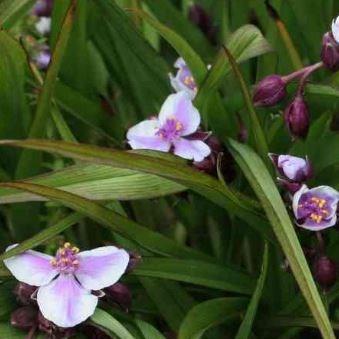
Tradescantia (Andersoniana Group) 'Bilberry Ice'
Spiderwort 'Bilberry Ice'
A beautiful hybrid Spiderwort with spear shaped long glossy leaves and glacier-blue florets from summer to autumn. Tradescantia plants are noted for their unusual triangular petals formed in clusters amongst sword-like foliage and as it's a perennial you can rely on it to make an attractive addition to your garden for many years. A very versatile plant that can be used as ground cover or to fill gaps in borders, it's also surprisingly rabbit-proof too. Tradescantia 'Bilberry Ice' requires very little maintenance and will grow easily in most soils and situations. Height and spread 45cm.
Contributed by @justin
-
Full sun
-
Very little water
-
Full Frost Hardy: 5F (-15°C)
-
Moist and fertile
Common name
Spiderwort 'Bilberry Ice'
Latin name
Tradescantia (Andersoniana Group) 'Bilberry Ice'
type
Herbaceous Perennials
family
Commelinaceae
ph
5.0 - 7.5 Acid - Neutral
Plant & bloom calendar
-
Best time to plant
full grown dimensions
 0.45 M
0.45 M
0.45 M
0.45 M
Tradescantia (Andersoniana Group) 'Bilberry Ice'
A beautiful hybrid Spiderwort with spear shaped long glossy leaves and glacier-blue florets from summer to autumn. Tradescantia plants are noted for their unusual triangular petals formed in clusters amongst sword-like foliage and as it's a perennial you can rely on it to make an attractive addition to your garden for many years. A very versatile plant that can be used as ground cover or to fill gaps in borders, it's also surprisingly rabbit-proof too. Tradescantia 'Bilberry Ice' requires very little maintenance and will grow easily in most soils and situations. Height and spread 45cm.
Planting young plants
From Late Autumn TO Mid Spring
Plant out garden species from autumn to spring in any fertile and moist soil in full sunlight. As the plants establish, pinch out regularly to promote bushy growth.
Propagation by division.
From Late Autumn TO Early Spring
Divide garden plants between late autumn and early spring. Place two hand forks back-to-back near the middle of the plant. Gently push the handles back and forth so that the prongs gradually tease the plant apart. Repeat the process with each portion to divide the plant into more sections, making sure each section has a healthy bud. Discard the old, woody growth from the centre of the plant. Some fibrous-rooted perennials, form a loose crown of many stems and can be simply pulled apart by hand without damaging the plant. You can also take off separate stems growing at the edge of the plant, just make sure each portion has its own roots.













